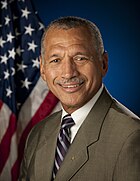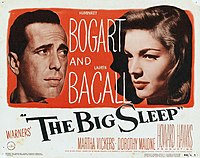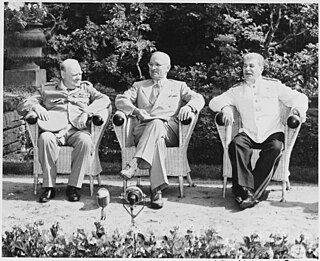
The Potsdam Conference was held at Potsdam in the Soviet occupation zone from July 17 to August 2, 1945, to allow the three leading Allies to plan the postwar peace, while avoiding the mistakes of the Paris Peace Conference of 1919. The participants were the Soviet Union, the United Kingdom, and the United States. They were represented respectively by General Secretary Joseph Stalin, Prime Ministers Winston Churchill and Clement Attlee, and President Harry S. Truman. They gathered to decide how to administer Germany, which had agreed to an unconditional surrender nine weeks earlier. The goals of the conference also included establishing the postwar order, solving issues on the peace treaty, and countering the effects of the war.
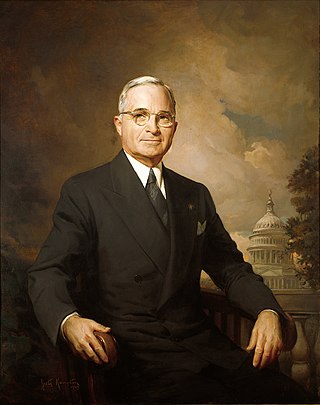
The Truman Doctrine is an American foreign policy that pledges American "support for democracies against authoritarian threats." The doctrine originated with the primary goal of countering the growth of the Soviet bloc during the Cold War. It was announced to Congress by President Harry S. Truman on March 12, 1947, and further developed on July 4, 1948, when he pledged to oppose the communist rebellions in Greece and Soviet demands from Turkey. More generally, the Truman Doctrine implied American support for other nations threatened by Moscow. It led to the formation of NATO in 1949. Historians often use Truman's speech to Congress on March 12, 1947 to date the start of the Cold War.

The Yalta Conference, held 4–11 February 1945, was the World War II meeting of the heads of government of the United States, the United Kingdom and the Soviet Union to discuss the postwar reorganization of Germany and Europe. The three states were represented by President Franklin D. Roosevelt, Prime Minister Winston Churchill, and General Secretary Joseph Stalin. The conference was held near Yalta in Crimea, Soviet Union, within the Livadia, Yusupov, and Vorontsov palaces.

Containment was a geopolitical strategic foreign policy pursued by the United States during the Cold War to prevent the spread of communism after the end of World War II. The name was loosely related to the term cordon sanitaire, which was containment of the Soviet Union in the interwar period.

Harry S. Truman was the 33rd president of the United States, serving from 1945 to 1953. A member of the Democratic Party, he previously served as a United States senator from Missouri from 1935 to 1945 and briefly as the 34th vice president in 1945 under Franklin D. Roosevelt. Assuming the presidency after Roosevelt's death, Truman implemented the Marshall Plan in the wake of World War II to rebuild the economy of Western Europe and established both the Truman Doctrine and NATO to contain the expansion of Soviet communism. He proposed numerous liberal domestic reforms, but few were enacted by the conservative coalition that dominated the Congress.

Harry S. Truman's tenure as the 33rd president of the United States began on April 12, 1945, upon the death of president Franklin D. Roosevelt, and ended on January 20, 1953. He had been vice president for only 82 days when he succeeded to the presidency. Truman, a Democrat from Missouri, ran for and won a full four-year term in the 1948 presidential election, in which he narrowly defeated Republican nominee Thomas E. Dewey and Dixiecrat nominee Strom Thurmond. Although exempted from the newly ratified Twenty-second Amendment, Truman did not run for a second full term in the 1952 presidential election because of his low popularity. He was succeeded by Republican Dwight D. Eisenhower.
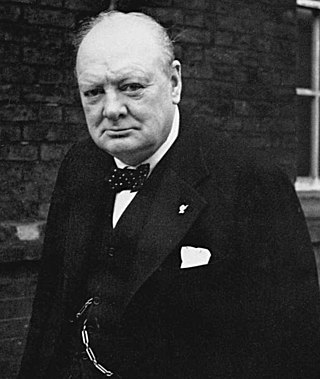
The following events occurred in March 1946:

The following events occurred in May 1946:

The following events occurred in June 1946:

The following events occurred in July 1946:

The following events occurred in September 1946:

The following events occurred in October 1946:
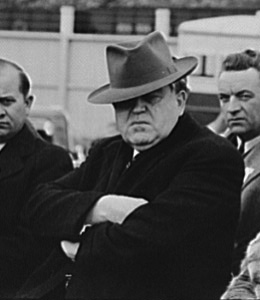
The following events occurred in November 1946:

The following events occurred in December 1946:

The following events occurred in March 1933:
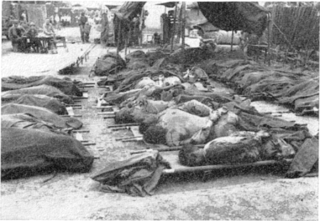
The following events occurred in August 1950:

The following events occurred in September 1950:
The following events occurred in January 1947:
The following events occurred in March 1947:
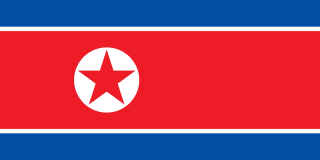
The following events occurred in September 1948:







